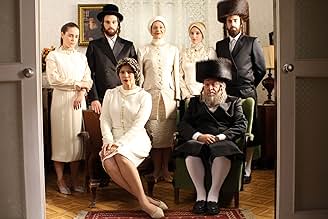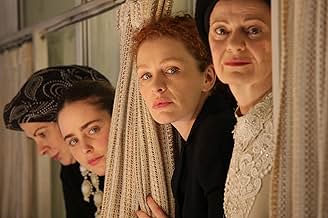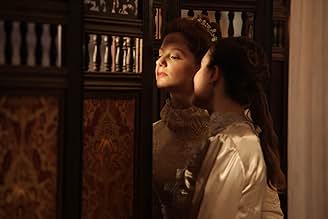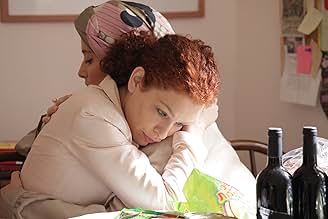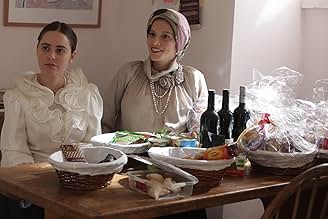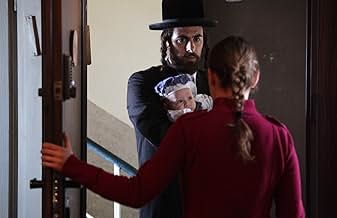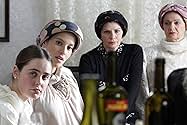VALUTAZIONE IMDb
6,7/10
4052
LA TUA VALUTAZIONE
Aggiungi una trama nella tua linguaWhen the older sister of Shira, an 18-year-old Hasidic Israeli, dies suddenly in childbirth, Shira must decide if she can and should marry her widowed brother-in-law, which also generates te... Leggi tuttoWhen the older sister of Shira, an 18-year-old Hasidic Israeli, dies suddenly in childbirth, Shira must decide if she can and should marry her widowed brother-in-law, which also generates tensions within her extended family.When the older sister of Shira, an 18-year-old Hasidic Israeli, dies suddenly in childbirth, Shira must decide if she can and should marry her widowed brother-in-law, which also generates tensions within her extended family.
- Regia
- Sceneggiatura
- Star
- Premi
- 14 vittorie e 16 candidature totali
Recensioni in evidenza
Israeli director Rama Burshtein's powerfully moving Fill the Void, Israel's submission to the 2012 Oscars, is about love and marriage but, in the Orthodox Hasidic community in Tel Aviv, they do not necessarily go together like a horse and carriage. Hadas Yaron, winner of the Best Actress Award at the Venice Film Festival in her first film role, is eighteen year-old Shira who is very close to being matched and promised to a local young man. When her older sister Esther (Renana Raz) dies in childbirth, however, her husband, the striking-looking Yochay (Yiftak Klein), is left to raise his young son Mordecai by himself and, according to tradition, has a duty to remarry once the formal mourning period is over.
This is where the film's central dilemma comes in and Shira's choice to "do the right thing" is severely tested by conflicting loyalties. After her family celebrates the Jewish holiday Purim, Shira and her mother, Rivka (Irit Sheleg) in a scene with Woody Allen overtones, are sent by the matchmaker to "shop" in the supermarket to find a suitable husband. When the right man is found, arrangements are made, even though Shira does not actually meet the young man until later in the film. When her mother learns that Yochay has a marriage offer from a widow living in Belgium, however, and cannot face the idea of the baby being taken away, she asks the matchmaker Mr. Shtreicher (Michael David Weigl) to arrange for Shira to marry Yochai, who is ten years older.
Fill the Void is a heartfelt and intimate look inside a world few of us ever have contact with. Sensitive to the orthodox community's rituals and traditions, however anachronistic they may seem to us, there is a feeling behind the rituals that binds people together and produces a feeling of closeness in the community, underscored by the rhythmic chants and joyous celebrations of special occasions. Though the purpose of every girl is to be married may seem offensive, in the culture in which it takes place, it is not demeaning, and the film does not stand in judgment of its characters or of the community.
As director Rama Buhrstein, a member of the Orthodox community herself, describes the film, "It's not about being an anthropologist or about religion or secularism. Rather, it's about the heart." Shira is asked to choose between her sense of duty to her family and community and her desire to fulfill her own dreams. Throughout the process, however, she is not alone and is always surrounded by love and support from mothers, fathers, aunts, rabbis, even though their advice may be conflicting. Her affectionate Aunt Hanna (Razia Israeli), who never married because of a disability, encourages Shira to do what is right for herself, putting her at odds with her mother.
Shira's older unwed cousin Frieda (Hila Feldman) tells her that it was Esther's wish that she marry Yochay if anything should happen to her, a proposition Yochay rebels at. Sensing Shira's confusion and uncertainty about marrying Yochay, however, the chief Rabbi (Melech Thal) refuses to bless the marriage. Even as many emotions seem to be happening all at the same time, the resolution of the conflict is poignant and even beautiful and it all comes together in a memorable final shot.
This is where the film's central dilemma comes in and Shira's choice to "do the right thing" is severely tested by conflicting loyalties. After her family celebrates the Jewish holiday Purim, Shira and her mother, Rivka (Irit Sheleg) in a scene with Woody Allen overtones, are sent by the matchmaker to "shop" in the supermarket to find a suitable husband. When the right man is found, arrangements are made, even though Shira does not actually meet the young man until later in the film. When her mother learns that Yochay has a marriage offer from a widow living in Belgium, however, and cannot face the idea of the baby being taken away, she asks the matchmaker Mr. Shtreicher (Michael David Weigl) to arrange for Shira to marry Yochai, who is ten years older.
Fill the Void is a heartfelt and intimate look inside a world few of us ever have contact with. Sensitive to the orthodox community's rituals and traditions, however anachronistic they may seem to us, there is a feeling behind the rituals that binds people together and produces a feeling of closeness in the community, underscored by the rhythmic chants and joyous celebrations of special occasions. Though the purpose of every girl is to be married may seem offensive, in the culture in which it takes place, it is not demeaning, and the film does not stand in judgment of its characters or of the community.
As director Rama Buhrstein, a member of the Orthodox community herself, describes the film, "It's not about being an anthropologist or about religion or secularism. Rather, it's about the heart." Shira is asked to choose between her sense of duty to her family and community and her desire to fulfill her own dreams. Throughout the process, however, she is not alone and is always surrounded by love and support from mothers, fathers, aunts, rabbis, even though their advice may be conflicting. Her affectionate Aunt Hanna (Razia Israeli), who never married because of a disability, encourages Shira to do what is right for herself, putting her at odds with her mother.
Shira's older unwed cousin Frieda (Hila Feldman) tells her that it was Esther's wish that she marry Yochay if anything should happen to her, a proposition Yochay rebels at. Sensing Shira's confusion and uncertainty about marrying Yochay, however, the chief Rabbi (Melech Thal) refuses to bless the marriage. Even as many emotions seem to be happening all at the same time, the resolution of the conflict is poignant and even beautiful and it all comes together in a memorable final shot.
Set in an orthodox Hasidic Jewish community in Tel Aviv, FILL THE VOID centers around eighteen-year-old Shira's (Haldas Yaron), decision about whether to marry widower Yochay (Yiftach Klein) or not. Yochay was already married to her sister Esther (Renana Raz), but sadly Esther passed away during childbirth. The title sums up the film's principal theme: by following her family's fishes, Shira will fill the void created by Esther's passing, and hence become a good mother to Esther and Yochay's newly-born son Mordecai. Morally speaking, she believes she is doing the right thing by accepting Yochay's offer, but director Rama Burshtein asks us to reflect on whether the decision will fill the void in Shira's life, or simply deepen it. Issues of love never seem to enter Shira's mind; she believes she is obliged to marry, and hence works hard to persuade the rabbi (Melech Thal) to sanction her decision. The film is tightly constructed as a series of close-ups and two-shots: the camera gives us a unique insight into Shira's turbulent state of mind, as she sits opposite Yochay, her head bowed, her lip quivering as she tries her best to maintain a facade of calm. Her family offer her a limited amount of support, but it's clear that they are forcing her into marriage. The only way she can obtain succor is to pray to God: in one sequence she is photographed from above, her eyes staring into the camera, as she tries to listen to His word. The ending is quite achingly poignant; in her wedding dress, Shira looks stunningly beautiful, but she cannot sit still. Her body repeatedly rocks from left to right, almost as if she is trying to lull herself into a trance- like state to cope with her forthcoming ordeal. Burshtein cuts to the wedding ceremony, where her head is covered with a white sheet; she is quite literally blinded to what follows, while the families celebrate. The film ends with the now-married couple alone after the ceremony has concluded. They stand at either end of the room and Shira stares blankly into space, underlining the irony inherent in the film's title. A low-key film, but totally compelling nonetheless.
Gets _way_ further inside the world of the "Orthodox Jew" than anything I've ever even heard about before. The director and some of the actors really are Orthodox, so the portrayals of both home life and ceremonies that are seldom photographed are truly accurate, not just informed guesses. Yet this is not an "ethnographic record", it's a feature film. And the cinematography is excellent, about as far from an "amateur home movie" as you could possibly get.
The glass-half-full description is "a character study" - the glass-half-empty description is "slow boiler". Those prone to getting fidgety will probably be tested beyond their endurance. The psychological nuances aren't trivial - this film is the official submission of Israel to the Best Foreign Language Film for the Academy Awards.
The treatment of women looks "old-fashioned" to us: separate rooms, hair covering, emergency health care workers restricted if they might see something they normally wouldn't ...all the horror stories we've heard. This deeper look though shows us the considerable adaptation and flexibility around those rules-- architecture modified so those separate rooms aren't all that separate, a spinster covering her hair on the advice of her rebbe even though she'd never been married so people wouldn't ask so many awkward questions, the wife controlling the money in a rebbe's household, arranging clandestine peeks at potential mates via cellphone. The clumps of women standing in doorways reminded me powerfully of the clumps of servants in those Manor House period piece films like Gosford Park. The blocking of access to females in physical distress reminds me of stories out of Saudi Arabia. And the photo I saw later of a "fashion designer" Muslim hair covering looked so much like what these Orthodox women wear I did a double-take.
No easy answers, no "good guys" and "bad guys". There are both pros and cons. Downsides include difficulty finding a marriage partner, great difficulty keeping widows and widowers within the community, birth defects apparently from genetic inbreeding, and almost complete loss of input into the direction of the surrounding society/economy. Upsides include very strong support from both family and friends, and unparalleled community closeness. Where else do non-relatives easily call other adults by their pet names when the going gets rough? And how often do family friends feel free to proffer a word of contrary advice at any time? And although someone's decision to move away is often somewhat painful to others, where else would people literally rather die?
Beforehand I was ready to keep my distance and laugh at "those silly people". But watching it I realized the film applies equally well to _all_ communities that are "in the world but not of the world": fundamentalist Christians; even hippies who've resigned themselves to having zero political influence. There's a whole lot of space in the middle on the line with "modern society" on one end and "a cult" on the other end. Although on the surface this film is about a particular world that's about as familiar to me as living on Mars, the deeper story of gaining community but losing interaction with the surrounding society/economy still has me ruminating days later.
The glass-half-full description is "a character study" - the glass-half-empty description is "slow boiler". Those prone to getting fidgety will probably be tested beyond their endurance. The psychological nuances aren't trivial - this film is the official submission of Israel to the Best Foreign Language Film for the Academy Awards.
The treatment of women looks "old-fashioned" to us: separate rooms, hair covering, emergency health care workers restricted if they might see something they normally wouldn't ...all the horror stories we've heard. This deeper look though shows us the considerable adaptation and flexibility around those rules-- architecture modified so those separate rooms aren't all that separate, a spinster covering her hair on the advice of her rebbe even though she'd never been married so people wouldn't ask so many awkward questions, the wife controlling the money in a rebbe's household, arranging clandestine peeks at potential mates via cellphone. The clumps of women standing in doorways reminded me powerfully of the clumps of servants in those Manor House period piece films like Gosford Park. The blocking of access to females in physical distress reminds me of stories out of Saudi Arabia. And the photo I saw later of a "fashion designer" Muslim hair covering looked so much like what these Orthodox women wear I did a double-take.
No easy answers, no "good guys" and "bad guys". There are both pros and cons. Downsides include difficulty finding a marriage partner, great difficulty keeping widows and widowers within the community, birth defects apparently from genetic inbreeding, and almost complete loss of input into the direction of the surrounding society/economy. Upsides include very strong support from both family and friends, and unparalleled community closeness. Where else do non-relatives easily call other adults by their pet names when the going gets rough? And how often do family friends feel free to proffer a word of contrary advice at any time? And although someone's decision to move away is often somewhat painful to others, where else would people literally rather die?
Beforehand I was ready to keep my distance and laugh at "those silly people". But watching it I realized the film applies equally well to _all_ communities that are "in the world but not of the world": fundamentalist Christians; even hippies who've resigned themselves to having zero political influence. There's a whole lot of space in the middle on the line with "modern society" on one end and "a cult" on the other end. Although on the surface this film is about a particular world that's about as familiar to me as living on Mars, the deeper story of gaining community but losing interaction with the surrounding society/economy still has me ruminating days later.
10clg238
This is a gorgeous film. The cinematography, largely revealing closeups of the characters, is stunning, bringing us close in to an unfamiliar world, an insular, deeply religious culture. The acting is flawless. But what brings me to give this film a top rating is the story, one of moral complexity--life, after all, is complicated, a truism that Hollywood films fail miserably in addressing, the rare times they attempt to do so (perhaps "The Master" and "Doubt" are exceptions). A young, innocent woman desires to make a marriage match that is in accordance with her Jewish Orthodox tradition and yet in some ineffable way is personally to her taste. At first this seems possible, but unforeseen circumstances make her choice of marriage partner difficult. She is not just choosing for herself and potential partner but her choice is central to the happiness or unhappiness of relatives and friends—a situation of which she is acutely aware. How can she make the right choice for everyone, herself included? In a culture seeped in moral values, the moral answer to her dilemma is not an easy one. It has been a long time since I've been so deeply moved by a film.
Over the last dozen or so years, no less than seven films have been made about the orthodox religious community in Israel. These films are:
Forbidden Love (1999); Kadosh (1999); Bat Kol (Inner Voice) (2002); Ushpizin (2004); My Father, My Lord (2007); The Secrets (2007); Eyes Wide Open (2009).
All these films were made by non-religious or at least non-orthodox film makers, and then along came Fill the Void. Its director and scriptwriter, Rama Burshtein, is an orthodox woman who is also a film maker.
Which raises the question whether this new film is more authentic than the previous ones, whether it portrays the orthodox community more faithfully. It should be understood that the orthodox communities in Israel are tightly-knit units, abhorring the outside, modern Western way of life which they perceive as decadent, immoral and corruptive. They still dress as did their ancestors in the Shtetl in Eastern Europe centuries ago, talk mostly Yiddish among themselves and of course, inter-marry only within their milieu.
Fill the Void is indeed about this latter issue, the question of marriage. The questions raised by the protagonists may seem quaint and even amusing to us, but seem of paramount importance to them, as if no other issues occupy their closed life.
This reviewer has no way of assessing the veracity of the facts and can only rely on subjective impressions. The film "rings true", feels true, and the fact that some of the actors come from a religious background adds to the feeling. Viewers might sneer at the seemingly irrelevant questions facing those "strange" people, but the acting convincingly conveys the sentiment that we are indeed dealing with a grave situation.
I came out of the theater thinking not about the heroine, blandly played by Hila Feldman, or about the way she handles her private demons and dilemmas, but about the strange, foreign, incomprehensible community living not a mile away from my house in the same city, yet separated from me by an unbridgeable chasm.
A disturbing movie.
Forbidden Love (1999); Kadosh (1999); Bat Kol (Inner Voice) (2002); Ushpizin (2004); My Father, My Lord (2007); The Secrets (2007); Eyes Wide Open (2009).
All these films were made by non-religious or at least non-orthodox film makers, and then along came Fill the Void. Its director and scriptwriter, Rama Burshtein, is an orthodox woman who is also a film maker.
Which raises the question whether this new film is more authentic than the previous ones, whether it portrays the orthodox community more faithfully. It should be understood that the orthodox communities in Israel are tightly-knit units, abhorring the outside, modern Western way of life which they perceive as decadent, immoral and corruptive. They still dress as did their ancestors in the Shtetl in Eastern Europe centuries ago, talk mostly Yiddish among themselves and of course, inter-marry only within their milieu.
Fill the Void is indeed about this latter issue, the question of marriage. The questions raised by the protagonists may seem quaint and even amusing to us, but seem of paramount importance to them, as if no other issues occupy their closed life.
This reviewer has no way of assessing the veracity of the facts and can only rely on subjective impressions. The film "rings true", feels true, and the fact that some of the actors come from a religious background adds to the feeling. Viewers might sneer at the seemingly irrelevant questions facing those "strange" people, but the acting convincingly conveys the sentiment that we are indeed dealing with a grave situation.
I came out of the theater thinking not about the heroine, blandly played by Hila Feldman, or about the way she handles her private demons and dilemmas, but about the strange, foreign, incomprehensible community living not a mile away from my house in the same city, yet separated from me by an unbridgeable chasm.
A disturbing movie.
Lo sapevi?
- QuizHadas Yaron had to lie to get out of her military duty to audition for the film.
- ConnessioniFeatured in At the Movies: Venice Film Festival 2012 (2012)
- Colonne sonoreIm Eshkachech Yerushalayim
(uncredited)
I più visti
Accedi per valutare e creare un elenco di titoli salvati per ottenere consigli personalizzati
- How long is Fill the Void?Powered by Alexa
Dettagli
Botteghino
- Lordo Stati Uniti e Canada
- 1.775.316 USD
- Fine settimana di apertura Stati Uniti e Canada
- 59.164 USD
- 26 mag 2013
- Lordo in tutto il mondo
- 3.197.615 USD
- Tempo di esecuzione
- 1h 30min(90 min)
- Colore
- Mix di suoni
- Proporzioni
- 2.35 : 1
Contribuisci a questa pagina
Suggerisci una modifica o aggiungi i contenuti mancanti







